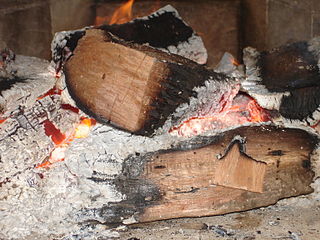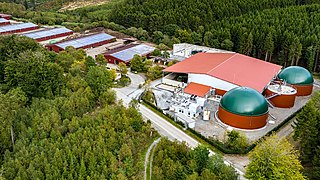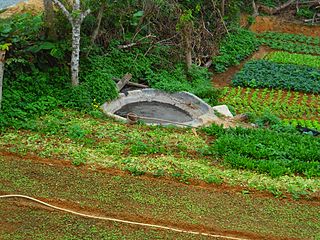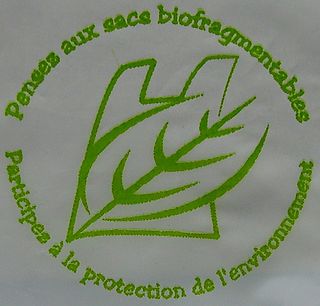Related Research Articles

Compost is a mixture of ingredients used as plant fertilizer and to improve soil's physical, chemical and biological properties. It is commonly prepared by decomposing plant, food waste, recycling organic materials and manure. The resulting mixture is rich in plant nutrients and beneficial organisms, such as bacteria, protozoa, nematodes and fungi. Compost improves soil fertility in gardens, landscaping, horticulture, urban agriculture, and organic farming, reducing dependency on commercial chemical fertilizers. The benefits of compost include providing nutrients to crops as fertilizer, acting as a soil conditioner, increasing the humus or humic acid contents of the soil, and introducing beneficial microbes that help to suppress pathogens in the soil and reduce soil-borne diseases.

In classical soil science, humus is the dark organic matter in soil that is formed by the decomposition of plant and animal matter. It is a kind of soil organic matter. It is rich in nutrients and retains moisture in the soil. Humus is the Latin word for "earth" or "ground".

Biodegradation is the breakdown of organic matter by microorganisms, such as bacteria and fungi. It is generally assumed to be a natural process, which differentiates it from composting. Composting is a human-driven process in which biodegradation occurs under a specific set of circumstances.

Vermicompost (vermi-compost) is the product of the decomposition process using various species of worms, usually red wigglers, white worms, and other earthworms, to create a mixture of decomposing vegetable or food waste, bedding materials, and vermicast. This process is called vermicomposting, while the rearing of worms for this purpose is called vermiculture.

Waste management or waste disposal includes the processes and actions required to manage waste from its inception to its final disposal. This includes the collection, transport, treatment and disposal of waste, together with monitoring and regulation of the waste management process and waste-related laws, technologies, economic mechanisms.

A landfill site, also known as a tip, dump, rubbish dump, garbage dump, or dumping ground, is a site for the disposal of waste materials. Landfill is the oldest and most common form of waste disposal, although the systematic burial of the waste with daily, intermediate and final covers only began in the 1940s. In the past, refuse was simply left in piles or thrown into pits; in archeology this is known as a midden.

The pyrolysis process is the thermal decomposition of materials at elevated temperatures, often in an inert atmosphere. It involves a change of chemical composition. The word is coined from the Greek-derived elements pyro "fire", "heat", "fever" and lysis "separating".
Organic matter, organic material, or natural organic matter refers to the large source of carbon-based compounds found within natural and engineered, terrestrial, and aquatic environments. It is matter composed of organic compounds that have come from the feces and remains of organisms such as plants and animals. Organic molecules can also be made by chemical reactions that do not involve life. Basic structures are created from cellulose, tannin, cutin, and lignin, along with other various proteins, lipids, and carbohydrates. Organic matter is very important in the movement of nutrients in the environment and plays a role in water retention on the surface of the planet.
Chemical changes occur when a substance combines with another to form a new substance, called chemical synthesis or, alternatively, chemical decomposition into two or more different substances. These processes are called chemical reactions and, in general, are not reversible except by further chemical reactions. Some reactions produce heat and are called exothermic reactions and others may require heat to enable the reaction to occur, which are called endothermic reactions. Understanding chemical changes is a major part of the science of chemistry.

Anaerobic digestion is a sequence of processes by which microorganisms break down biodegradable material in the absence of oxygen. The process is used for industrial or domestic purposes to manage waste or to produce fuels. Much of the fermentation used industrially to produce food and drink products, as well as home fermentation, uses anaerobic digestion.

A leachate is any liquid that, in the course of passing through matter, extracts soluble or suspended solids, or any other component of the material through which it has passed.

Organic fertilizers are fertilizers that are naturally produced. Fertilizers are materials that can be added to soil or plants, in order to provide nutrients and sustain growth. Typical organic fertilizers include all animal waste including meat processing waste, manure, slurry, and guano; plus plant based fertilizers such as compost; and biosolids. Inorganic "organic fertilizers" include minerals and ash. The organic-mess refers to the Principles of Organic Agriculture, which determines whether a fertilizer can be used for commercial organic agriculture, not whether the fertilizer consists of organic compounds.

In biology, detritus is dead particulate organic material, as distinguished from dissolved organic material. Detritus typically includes the bodies or fragments of bodies of dead organisms, and fecal material. Detritus typically hosts communities of microorganisms that colonize and decompose it. In terrestrial ecosystems it is present as leaf litter and other organic matter that is intermixed with soil, which is denominated "soil organic matter". The detritus of aquatic ecosystems is organic material that is suspended in the water and accumulates in depositions on the floor of the body of water; when this floor is a seabed, such a deposition is denominated "marine snow".

Biodegradable waste includes any organic matter in waste which can be broken down into carbon dioxide, water, methane or simple organic molecules by micro-organisms and other living things by composting, aerobic digestion, anaerobic digestion or similar processes. It mainly includes kitchen waste, ash, soil, dung and other plant matter. In waste management, it also includes some inorganic materials which can be decomposed by bacteria. Such materials include gypsum and its products such as plasterboard and other simple sulfates which can be decomposed by sulfate reducing bacteria to yield hydrogen sulfide in anaerobic land-fill conditions.

Digestate is the material remaining after the anaerobic digestion of a biodegradable feedstock. Anaerobic digestion produces two main products: digestate and biogas. Digestate is produced both by acidogenesis and methanogenesis and each has different characteristics. These characteristics stem from the original feedstock source as well as the processes themselves.

Leaching is the process of a solute becoming detached or extracted from its carrier substance by way of a solvent.

Biodegradable bags are bags that are capable of being decomposed by bacteria or other living organisms.
Organic hydroponics is a hydroponics culture system based on organic agriculture concepts that does not use synthetic inputs such as fertilizers or pesticides. In organic hydroponics, nutrient solutions are derived from organic plant and animal material or naturally mined substances. Most studies on the topic have focused on the use of organic fertilizer.

Soil regeneration, as a particular form of ecological regeneration within the field of restoration ecology, is creating new soil and rejuvenating soil health by: minimizing the loss of topsoil, retaining more carbon than is depleted, boosting biodiversity, and maintaining proper water and nutrient cycling. This has many benefits, such as: soil sequestration of carbon in response to a growing threat of climate change, a reduced risk of soil erosion, and increased overall soil resilience.
Home composting is the process of using household waste to make compost at home. Composting is the biological decomposition of organic waste by recycling food and other organic materials into compost. Home composting can be practiced within households for various environmental advantages, such as increasing soil fertility, reduce landfill and methane contribution, and limit food waste.
References
- ↑ Waste management system on Badung River area in Bali. IOP Conf. Series: Earth and Environmental Science. doi: 10.1088/1755-1315/351/1/012005 .
 This article incorporates text available under the CC BY 3.0 license.
This article incorporates text available under the CC BY 3.0 license. - ↑ "Understanding Waste:Inorganic vs Organic Materials". asiapulppaper.com. Retrieved 5 November 2020.
- ↑ "Understanding Waste: Inorganic vs Organic Materials". asiapulppaper.com. Retrieved 1 August 2020.